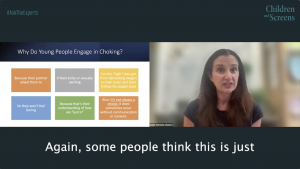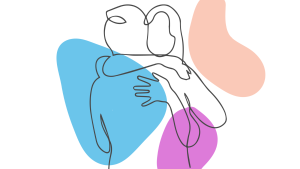
Debby Herbenick, PhD (Provost Professor, Director of the Center for Sexual Health Promotion, Indiana University School of Public Health) discusses the prevalence of sexual choking—and the reasons for doing so–among young adults, with considerations for gender identity at the #AskTheExperts webinar “The New Sex Educator? Online Sexual Content and Today’s Youth” on May 22, 2024.
Read the Video Transcript
[Dr. Debby Herbenick] So why do young people engage in choking? I get asked this all the time. Sometimes they say it’s because their partner asked them to choke them, and they wanted to please their partner. It feels kinky or exciting. Some notice the high that the body can experience from decreasing oxygen to the brain, and then reoxygenating when they release the pressure. Some don’t want to be perceived as boring. Again, some people think this is just how sex is today because of what they’ve seen in the media or heard about from friends. And of course, for some people, it’s not a choice to begin with. It can sometimes occur, of course, without any communication or consent. However, sexual choking is now very mainstream and prevalent among young people. It used to be considered exceptionally rare. At the beginning of my 25-year career, we would have put it at probably about 1%. In fact, in our US nationally-representative studies, when we look at people 50 and older and say, “Have you, you know, ever in your life engaged in this?” Almost none of them say that they have. It’s really that low, around 1%. But these days, it’s very common. We have conducted four college campus representative surveys of thousands of randomly-sampled college students in each one, and we consistently find that around two-thirds of women, nearly a third of men, and more than half of transgender and nonbinary college students report having been choked, usually consensually.
View the full webinar

The New Sex Educator? Online Sexual Content and Today’s Youth
How much and how easily are youth accessing sexual content online? How does what they view shape their perception of “normal” in romantic and sexual relationships? Is the increasing prevalence of AI playing a role?
Carolyn West, PhD
Professor of Clinical Psychology, University of Washington
Elizabeth Englander, PhD
Director, Massachusetts Aggression Reduction Center; Professor of Psychology, Bridgewater State University
Debra Herbenick, PhD, MPH
Provost Professor, Director of the Center for Sexual Health Promotion, Indiana University School of Public Health
Amy Lang, MA
Sexual Health Educator, Birds & Bees & Kids
Jennifer Stevens Aubrey, PhD
Professor of Communication, University of Arizona




